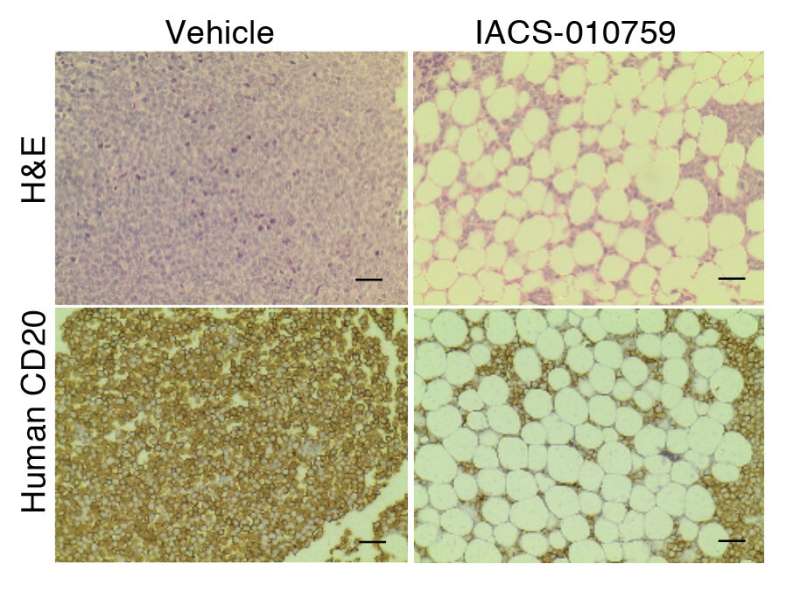Study shows new drug effective in overcoming ibrutinib resistance in mantle cell lymphona

A study at The University of Texas MD Anderson Cancer Center demonstrated how a small molecule drug discovered at the institution may help overcome resistance to treatment with ibrutinib in patients with mantle cell lymphoma.
The drug, IACS-10759, was the first therapy to be developed from concept to clinical trial by MD Anderson's Therapeutics Discovery division, a unique drug-discovery engine created to answer unmet patient needs. IACS-10759 is currently in Phase I clinical trials for acute myeloid leukemia as well as for solid tumors and lymphoma.
Results from a study exploring the drug's effectiveness in ibrutinib-resistant mantle cell lymphoma were published in the May 8 online issue of Science Translational Medicine.
The study explored the link between metabolic reprogramming and cancer cell growth, metastasis and therapeutic resistance, using three different patient-derived xenograft mouse models and genomic analysis of specimens. Metabolic reprogramming is an emerging hallmark of tumor biology in which cancer cells evolve to rely on two key metabolic processes—glycolysis and oxidative phosphorylation (OXPHOS) - to support their growth and survival.
"To investigate the therapeutic effects of IACS-10759, we developed an ibrutinib-resistant B-cell lymphoma mouse model using tumor cells isolated from cerebrospinal fluid from a patient who did not respond to multiple therapies including ibrutinib," said Michael Wang, M.D., professor of Lymphoma & Myeloma and study lead. "We showed that metabolic reprogramming toward OXPHOS and glutaminolysis is associated with therapeutic resistance to ibrutinib in mantle cell lymphoma, an incurable B-cell lymphoma with poor clinical outcomes. Inhibition of OXPHOS with IACS-10759 results in marked growth inhibition in vivo and in vitro in ibrutinib-resistant, patient-derived cancer models."
Clinical trials nationally have focused on the PI3K/AKT/mTOR pathway in relapsed and/or refractory lymphoma, but clinical success thus far has been limited. Wang's team showed evidence that glutaminolysis and OXPHOS appear to be a prominent energy metabolism pathway in ibrutinib-resistant mantle cell lymphoma cells.
Ibrutinib was approved by the U.S. Food and Drug Administration in 2013 for treatment of relapsed/refractory mantle cell lymphoma and is now used as a front-line therapy. The drug has demonstrated anti-tumor activity with an overall response rate of 68 percent and median survival duration of 18 months.
Given that the one-year survival rate is 22 percent after relapse on ibrutinib, there is an urgent need to identify alternate therapeutic options for mantle cell lymphoma, according to co-senior author Linghua Wang, Ph.D., assistant professor of Genomic Medicine, who said the study "warrants the exploitation of active cancer metabolic pathways, especially OXPHOS and glutaminolysis, to improve clinical outcomes for mantle cell lymphoma and other lymphomas."
Further investigation is ongoing and with a Phase I lymphoma trial that will include an ibrutinib-resistant cohort.
More information: L. Zhang el al., "Metabolic reprogramming toward oxidative phosphorylation identifies a therapeutic target for mantle cell lymphoma," Science Translational Medicine (2019). stm.sciencemag.org/lookup/doi/ … scitranslmed.aau1167

















